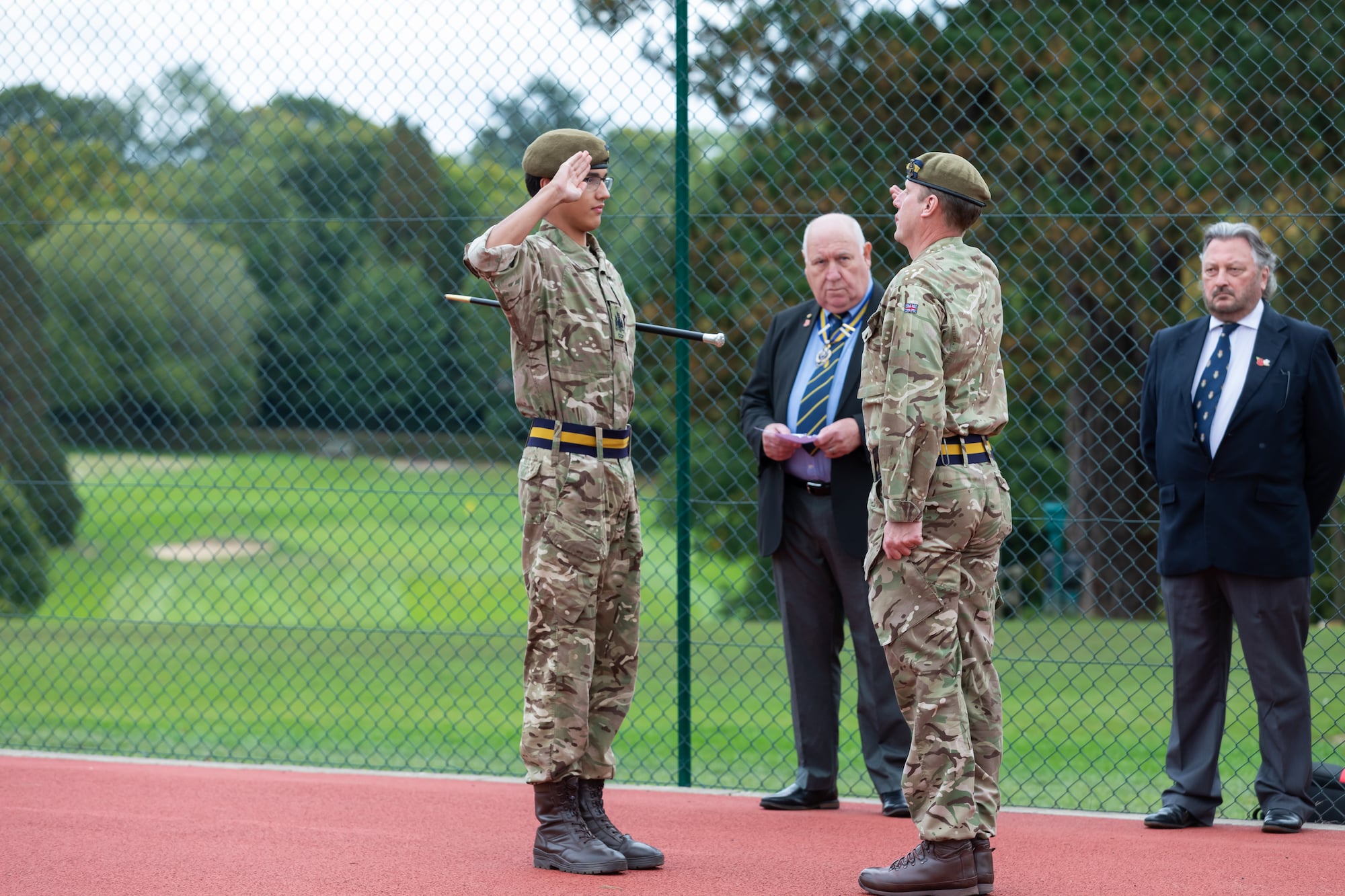 Sad news reached the School a few days before the competition that Mr Cyril Dashwood, benefactor of the Dashwood Piano Prize had passed away, only a few weeks after presenting the 2012 junior prize. He would, I am sure, have agreed with adjudicator Katherine Dienes-Williams’s decision to award the senior piano prize to Hebe Westcott. Her subtle and touching performance of an intermezzo by Brahms had a natural rubato and a poignant bitter-sweet quality, drawing the listeners into the music with the intensity of the quiet playing, but fully able to rise to the contrasting sections. Ruby Joy impressed with her pianism in an energetic (almost frenetic) interpretation of Chopin’s Fantaisie-Impromptu in which even the big tune had a restless quality. Ben Rudolf also brought great energy to a Schumann movement, emphasising the more masculine side of the composer’s Florestan/Eusebius polarity.
Sad news reached the School a few days before the competition that Mr Cyril Dashwood, benefactor of the Dashwood Piano Prize had passed away, only a few weeks after presenting the 2012 junior prize. He would, I am sure, have agreed with adjudicator Katherine Dienes-Williams’s decision to award the senior piano prize to Hebe Westcott. Her subtle and touching performance of an intermezzo by Brahms had a natural rubato and a poignant bitter-sweet quality, drawing the listeners into the music with the intensity of the quiet playing, but fully able to rise to the contrasting sections. Ruby Joy impressed with her pianism in an energetic (almost frenetic) interpretation of Chopin’s Fantaisie-Impromptu in which even the big tune had a restless quality. Ben Rudolf also brought great energy to a Schumann movement, emphasising the more masculine side of the composer’s Florestan/Eusebius polarity.
Ben was even more assured on violin in the opening of a Mozart concerto: the music was kept in scale and there was some delightfully nonchalant phrasing. Ian Lee brought subtle colours and impeccable tuning to an arrangement of Shostakovitch but the strings prize went to the other ’cellist, Louisa Golden, who played an arrangement of Granados (with hair decoration to match) by the great ’cellist Gaspar Cassadó. The opening intense vibrato grabbed the attention of the Speech Hall audience and then the relaxed rhythms created a truly Spanish atmosphere.
Another musician who appeared twice was Henry Harrod, whose very Russian rendering of the ‘Russischer Tanz’ by Oscar Böhme, who played cornet in the Mariinsky Theatre in St Petersburg for 24 years. Henry really listens to his trumpet’s tone, to keep it focused, and coped better than most with the generous acoustics of the Speech Hall. He took the brass prize from trombonists Alex Curtis (a Mozart ‘Agnus Dei’ arrangement) and Millie Crane (the familiar Fantasy by Curnow) who both showed us that the instrument does not have to do a comic turn and can be solemn and poignant.
Henry also sang impressively (Michael Head’s ‘Money, O!’) and set the tone for all three singers, whose diction was impeccable and communication remarkable. On a cold wet day (April 27th) the final song, Gershwin’s ‘Summertime’, was most welcome in Charlotte Bradbrook’s sultry rendering but the winning song had taken us into a misty dawn after the ‘black bat’ of night had flown from the garden of Tennyson’s Maud. This setting by Dubliner Michael Balfe used to be immensely popular and tenor Tom Hollister brought all his musical skills to bear on this parlour song, despite a throat infection which meant he had to keep the tone and dynamic range under control. The intelligent colouring of phrasing and the Irish snap in Richard Saxel’s accompaniment gave fresh life to love’s old sweet song.
Adjudicator Katherine Dienes-Williams made it clear that the hardest of many close decisions was in the woodwind section. Both wind players were absolutely outstanding. Harry McCagherty really rose to the occasion in the opening of Mozart’s Oboe concerto. His first flourish and sustained long note were arresting; breath control was remarkable; the tone attractively perky; the phrasing stylishly musical; and the cadenza with its high notes was a tour-de-force. But equally stunning and even more of a technical challenge was the performance of Lutoslawski’s clarinet Dance Preludes by Chloё Allison. The articulation was immaculate; the mystery in the second was haunting and the echoes of Bartok were given full value. The angular rhythms seemed as natural to this player as to any peasant dance band player but the sophistication needed to suggest this comes only with hours of practice. Similar time would have been needed to achieve the level of perfection in the recorder piece by Walter Bergmann, a piece which demands note-perfect virtuosity at lightning speed and an eloquence that echoes ‘The Lark Ascending’. This was perhaps also the performance in which there was most a sense of a duo of equals with Chloё and Richard Saxel.
Marcus Pashley warmly welcomed and thanked the adjudicator, who was the first female organist and choir director to be appointed by a Church of England cathedral. Mrs Dienes-Williams, in praising the confidence and musical communication of all 15 musicians, kindly but understandably stated that the quality of the concert was so high that she would happily have paid for a ticket. Early readers of this review can do just that by booking for the “Encore” winners’ concert on Friday May 18th: Marcus Pashley has a cornucopia of excellence from which to select the items for this gala concert.
PJL
Back to all news











